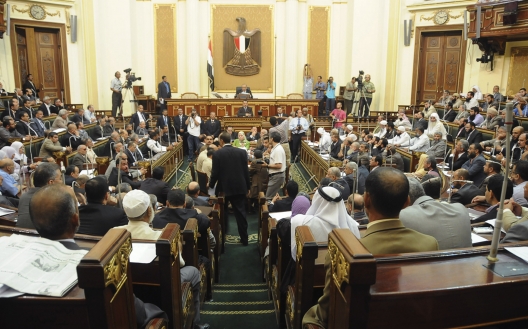 In an Egypt where the tide has decidedly turned in strong favor of a military-backed goverment and against virtually any form of dissent, President General Abdel Fattah al-Sisi presides over a fragmented, uncoordinated, and incomplete system of governance. In order to maintain discipline and control, Sisi will have to reconstruct the institutions and government bodies–and outgoing president Adly Mansour started the process by passing a new law regulating the parliamentary elections. The parliamentary elections law, however, tilts the balance of power even further in favor of the executive branch in a climate where Sisi already commands disproportionate power.
In an Egypt where the tide has decidedly turned in strong favor of a military-backed goverment and against virtually any form of dissent, President General Abdel Fattah al-Sisi presides over a fragmented, uncoordinated, and incomplete system of governance. In order to maintain discipline and control, Sisi will have to reconstruct the institutions and government bodies–and outgoing president Adly Mansour started the process by passing a new law regulating the parliamentary elections. The parliamentary elections law, however, tilts the balance of power even further in favor of the executive branch in a climate where Sisi already commands disproportionate power.
Nathan Brown, professor of political science and international affairs at the George Washington University and nonresident senior associate at the Carnegie Endowment for International Peace, and Scott Williamson, junior fellow at the Carnegie Endowment for International Peace, examine the mechanics of the new law in their recent article on EgyptSource titled, “Egypt’s New Law for Parliamentary Elections Sets Up a Weak Legislature.”
The authors examine the need for a new parliamentary elections law, the specific provisions that will determine the parliement’s membership, function, and political culture, and implications for its future relationship with the executive branch. Read the article on EgyptSource here.
Image: Photo: Parliament members attend a session at the parliament building in Cairo, July 10, 2012. (Reuters)
